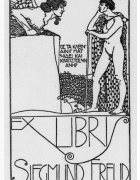
Ha llamado Cortázar
Tuve, hace años, una amiga que se llamaba Rosa. Estudiábamos teatro con Alberto Miralles en el TAI, el Taller de Seguir leyendo


Tuve, hace años, una amiga que se llamaba Rosa. Estudiábamos teatro con Alberto Miralles en el TAI, el Taller de Seguir leyendo

Sigo desde hace años el trabajo de Emilio González Sainz (Torrelavega, Cantabria, 1961). Sus interiores cargados de poesía; conchas, modelos Seguir leyendo

Ayer, trasteando en la Red di por casualidad con este precioso exlibris de Vladimir Nabokov, el autor de Lolita. Es Seguir leyendo

Cada año preparo, en navidades, un regalo para amigos. Una edición de apenas cincuenta ejemplares en la que siempre lío Seguir leyendo

He estado esta semana pasada en Panamá, invitado al VI Congreso de la lengua que se celebraba en la ciudad. Seguir leyendo

No hay constancia de que llegaran siquiera a conocerse, a coincidir en algún lugar o a cruzarse accidentalmente por la Seguir leyendo

Me gusta hacer fotos a los escritores a los que entrevisto. Cuando grabo para la radio aprovecho siempre para llevar Seguir leyendo

La semana pasada estuve en México invitado por Conaculta. Daba una conferencia en Saltillo, estado de Coahuila, en el Encuentro Seguir leyendo